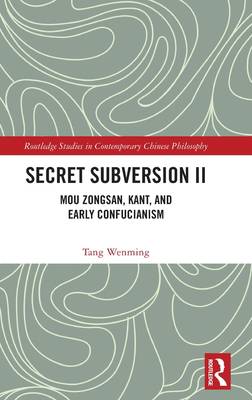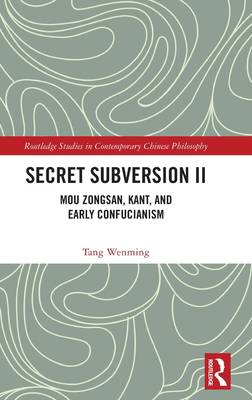
- Retrait gratuit dans votre magasin Club
- 7.000.000 titres dans notre catalogue
- Payer en toute sécurité
- Toujours un magasin près de chez vous
- Retrait gratuit dans votre magasin Club
- 7.000.0000 titres dans notre catalogue
- Payer en toute sécurité
- Toujours un magasin près de chez vous
Description
This title critically examines Mou Zongsan's philosophical system of moral metaphysics on the level of metaphysics and history philosophy, which combines Confucianism and Kantianism philosophy.
Mou Zongsan (1909-1995) is one of the representatives of Modern Confucianism and an important Chinese philosopher of the twentieth century. The two-volume set looks into the problems in the moral metaphysics by Mou and his systematic subversion of Confucianism on three levels: ethics, metaphysics and historical philosophy. In this second volume the author critiques Mou's philosophical development of Confucianism on the latter two levels. The first part analyzes Mou's view on conscience as ontology and his interpretation of the heavenly principles in Confucianism, arguing that his theory in fact abolishes Confucian cosmology based on modern scientific concepts and speaks for modern humanity. The second part focuses on Mou's remolding of historical philosophy based on the concept of freedom of Kant, Hegel, and modern Western philosophy, then assesses his ideological distortions of historical and political concepts in the Confucian tradition.
The title will appeal to scholars, students and philosophers interested in Chinese philosophy, Confucian ethics, Neo-Confucianism, and Comparative Philosophy.
Spécifications
Parties prenantes
- Auteur(s) :
- Editeur:
Contenu
- Nombre de pages :
- 182
- Langue:
- Anglais
- Collection :
Caractéristiques
- EAN:
- 9780815374435
- Date de parution :
- 22-09-22
- Format:
- Livre relié
- Format numérique:
- Genaaid
- Dimensions :
- 156 mm x 234 mm
- Poids :
- 435 g

Les avis
Nous publions uniquement les avis qui respectent les conditions requises. Consultez nos conditions pour les avis.






